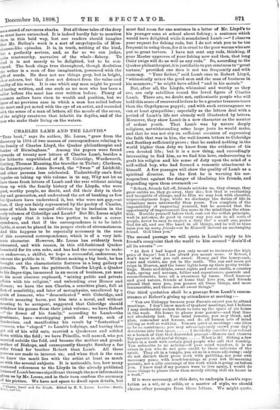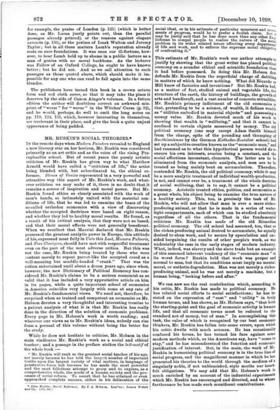CHARLES LAMB AND THE LLOYDS.*
"Tins book," says its author, Mr. Lucas, "grew from the discovery in 1894 of two masses of correspondence relating to the family of Charles Lloyd, the Quaker philanthropist and banker of Birmingham." Among the papers were found upwards of twenty new letters of Charles Lamb, besides a few hitherto unpublished of S. T. Coleridge, Wordsworth, Southey, Thomas Manning, the traveller in Thibet; Clarkson, the Emancipator ; Anna Seward, the " Swan " of Lichfield ; and other persons less celebrated. Undoubtedly one's first impulse on taking up this volume is to say, Why not let us have these fresh letters of Lamb and the rest without mixing them up with the family history of the Lloyds, who were good, worthy people, no doubt, and did their duty in their day and generation, and understood the art of banking as few but Quakers have understood it, but who were not gay,—at least, if they are fairly represented by the poetry of Charles, some of which has escaped oblivion by its inclusion in the early volumes of Coleridge and Lamb P But Mr. Lucas might fairly reply that it takes two parties to make a corre- spondence, and that if the correspondence is to be intel- ligible, it must be placed in its proper circle of circumstances. And this happens to be especially necessary in the case of this recovered correspondence, which is of a very inti- mate character. However, Mr. Lucas has evidently been interested, and with reason, in this old-fashioned Quaker household for its own sake, and has had the courage to make an endeavour, a skilful, we hope a successful, endeavour, to interest the publics in it. Without making a big book, he has brought out the characteristic features in a long gallery of portraits. We have the patriarch, Charles Lloyd, a Quaker to his finger-tips, immersed in an ocean of business, yet neat to his most obscure cupboard, " mixing public and private affairs with his -religion," and unbending over Homer and Horace; we have the son Charles, a sensitive plant, full at first of sensibility, and later of metaphysics, unrelieved by a grain of humour, who " domesticated " with Coleridge, and without meaning harm, put him into a novel, and without meaning to be arrogant, suggested that Coleridge should withdraw his poems from their joint volume; we have Robert —" the flower of his family," according to Lamb—the Passionate, hero - worshipping youth of twenty, sick of Quakerism, and manifesting his revolt by " fantastical " trousers, who `eloped" to Lamb's lodgings, and having thus got rid of his wild oats, married a Quakeress and settled down within the fold ; we have Priscilla, well named, who yet married outside the fold, and became the mother and grand- mother of Bishops, and consequently thought Southey a far safer friend for brother Robert than Lamb. All these persons are made to interest us; and when that is the case we know the merit lies with the artist at least ae much sa with the several subjects. It is noticeable, too, how many scattered references to the Lloyds in the already published letters of Lamb become significant through the new information given us by Mr. Lucas, and in their turn confirm the accuracy of his picture. We have not space to dwell upon details, but Charlex Lamb and the Lloyds. Edited by E. V. Lucas. London : Smith, Eider, and Cu. must find room for one sentence in a letter of Mr. Lloyd's to his younger sons at school about fishing ; a sentence which would have delighted while it scandalised Lamb :—" I observe your request for fishing rods, but I do not wish you to be too frequent in using them, for it is cruel to the poor worms who are put to great torture. I have not sent any rods, thinking, if your Master approves of your fishing now and then, that long Osier twigs will do as well as any rods." So, according to the Quaker philanthropist, it is justifiable to put creatures to "great torture," provided one does it not too frequently and with economy. " Your father," said Lamb once to Robert Lloyd, "whimsically mixes the good man and the man of business in his manners ; " he might have added " and in his morals."
But, after all, the Lloyds, whimsical and worthy as they are, are only satellites round the loved figure of Charles Lamb. There are, we doubt not, enthusiastic people who will hold this score of recovered letters to be a greater treasure-trove than the Oxyrhyncus papyri ; and with such extravagance we can at least sympathise; especially as the letters deal with a period of Lamb's life not already well illustrated by letters. Moreover, they show Lamb in a new character as the mentor of ardent youth. That Lamb was by nature deeply religions, notwithstanding scene large jests he would make, and that he was not shy on sufficient occasion of expressing the faith that was in him, the well-known letters to Coleridge and Southey sufficiently prove ; that he ranked nothing in the world higher than duty we know from the evidence of his own devoted life ; but it is a new thing, and exceedingly interesting to find him, as we find him here, endeavouring to graft his religion and his sense of duty upon the mind of a self-willed boy, who had formed a romantic attachment to himself. A few passages will show the quality of Lamb as a spiritual director. In the first he is warning his cor- respondent against the danger of idealising his friends, and depending upon them overmuch :—
" Robert, friends fall off, friends mistake us, they change, they grow unlike us, they go away, they die ; but God is everlasting and incapable of change, and to Him we may look with cheerful, unpresumptuous hope, while we discharge the duties of life in situations more untowardly than yours. You complain of the impossibility of improving yourself, but be assured that the opportunity of improvement lies more in the mind than the situa- tion. Humble yourself before God, cast out the selfish principle, wait in patience, do good in every way you can to all sorts of people, never be easy to neglect a duty tho' a small one, praise God for all, and see His hand in all things, and he will in time raise you up many friends—or be Himself instead an unchanging friend. God bless you."
The second passage we will quote is Lamb's reply to his friend's complaint that the world to him seemed " drain'd of all its sweets " :-
" At first I had hoped you only meant to insinuate the high price of Sugar ! but I am afraid you meant more. 0 Robert, I don't know what you call sweet. Honey and the honeycomb, roses and violets, are yet in the earth. The sun and moon yet reign in Heaven, and the lesser lights keep up their pretty twink- lings. Meats and drinks, sweet sights and sweet smells, a country walk, spring and autumn, follies and repentances, quarrels and reconcilements, have all a sweetness by turns. Good humour and good nature, friends at home that love you, and friends abroad that miss you, you possess all these things, and more innumerable, and these are all sweet things."
Our third quotation shall be a passage from Lamb's remon- strance at Robert's giving up attendance at meeting:— "You are Unhappy because your Parents expect you to attend meetings. I don't know much of Quakers' meetings, but I believe I may moderately reckon them to take up the space of six hours in the week. Six hours to please your parents—and that time not absolutely lost. Your mind remains, you may think, and plan, remember and foresee, and do all human acts of mind sitting as well as walking. You are quiet at meetings : one likes to be so sometimes; you may advantageously crowd your day's
devotions into that space I decidedly consider your refusal as a breach of that God-descended precept—Honour and observe
thy parents in all lawful things What is it? Sitting a few hours in a week with certain good people who call that worship. You subscribe to no articles—if your mind wanders, it is no crime in you who do not give credit to these infusions of the spirit. They sit in a temple, you sit as in a room adjoining ; only do not disturb their pious work with gabbling, nor your own necessary peace with heart-burnings at your not ill-meaning parents, nor a silly contempt of the work which is going on before you. I know that if my parents were to live again, I would do more things to please them than merely sitting still six hours in a week."
If it were necessary, at this date, to underpin Lamb's repu- tation as a wit, or a critic, or a master of style, we should choose other passages from these letters. We might quote, for example, the praise of London (p. 125) (which is better done, as Mr. Lucas justly points out, than the parallel passages already printed), or the reasons against elegant extracts (p. 135), or the praises of Izaak Walton and Jeremy Taylor ; but in all these matters Lamb's reputation already rests on sure foundations. It was once our ill-fortune, how- ever, to hear Lamb held up to shame in a public lecture as a man of genius with no moral backbone. As the lecturer was Fellow of an Oxford College, he ought to have known better ; but he did not. And so we call attention to such passages as those quoted above, which should make it im- possible for any one who can read to fall again into the same blunder.
The publishers have issued this book in a crown octavo Form and red cloth cover, so that it may take the place it deserves by the side of Canon Ainger's volumes. In a future edition the author will doubtless correct an awkward mis- print of " worst " for " worse " in the Witches' Curse (p. 92), and he would, perhaps, do well to omit the long notes on pp. 119, 124, 151, which, however interesting in themselves, are irrelevant in their place, and give the book a quite unjust appearance of being padded.











































 Previous page
Previous page